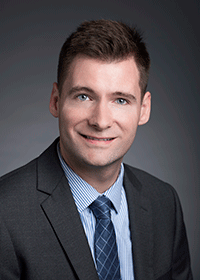“Scott works in the hot areas of statistics: big data, long-range time series data, Bayesian data analysis, and financial analytics.”
— William F. Rosenberger, professor and chairman of the Department of Statistics

Scott Bruce, an assistant professor in the Department of Statistics, has developed statistical methodology that can help with the interpretation of important health research.
Mason Engineering’s Scott Bruce sometimes loses sleep over his research, even though he knows the importance of getting enough shut-eye.
Sleep deprivation increases the risk of accidents and many serious health problems. For years, scientists have been monitoring and studying patients’ physiological characteristics, including their brain and heart activity during sleep.
“These signals are collected and monitored throughout the night, forming a large collection of time-series data,” says Bruce, an assistant professor in the Department of Statistics.
“I’ve developed a practical statistical methodology that can characterize the behavior of these time series and how they are associated with health outcomes. It’s being used to figure out potential pathways through which poor sleep quality may be linked to ill-health and functioning,” he says.
Bruce also developed new statistical methods to evaluate the sleeping habits of people who are primary caregivers for an ill spouse, as well as looking at healthy 20- and 30-year-olds without serious medical conditions. “There is a need for a methodology that can be used to uncover and explore significant differences in the characteristics of time-series data across different populations.”
From an application standpoint, this methodology can also be used to understand the characteristics of physiological time series data before and after a treatment or behavioral intervention is administered, he says. This can be useful for assessing if the treatment or intervention results in significant physiological changes.
Some of the same statistical methods can be applied to the study of neurodegenerative disorders, such as Parkinson’s disease, he says. Such disorders may affect a person’s balance, which can be assessed by analyzing the oscillatory patterns in gait and center of balance.
William F. Rosenberger, professor and chairman of the Department of Statistics, says, “Scott works in the hot areas of statistics: big data, long-range time series data, Bayesian data analysis, and financial analytics.”
Many health problems are linked to poor sleep, and scientists need access to the right statistical tools for exploring these connections, Bruce says. “My goal is to partner with researchers to better understand the problems they are facing and develop appropriate statistical solutions to address them.”
